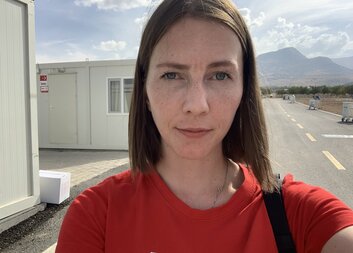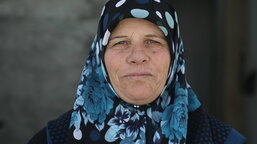One year has passed since the devastating earthquake that struck Turkey and Syria. It was a massive disaster from which, in particular, the affected areas are still recovering. The people affected by the earthquake are still dealing with the tragic consequences today. What is the situation in Turkey like one year on from the disaster? We talked to Irena Menšíková, Caritas Czech Republic employee, who has lived in the country for a long time.
Twelve months have passed since the catastrophic earthquake in Turkey and Syria that killed nearly 60,000 people and left millions homeless. What is the situation in Turkey one year on from the disaster?
The earthquake that hit Turkey and Syria had a genuinely vast and tragic impact. It would, therefore, be false to expect that, one year on from the disaster, everything will return to 'normal'. On the contrary, in the first days after the earthquake, we, as a humanitarian organisation, warned that it would take several years to rebuild the affected areas because the devastation was truly unimaginable, and the earthquake affected an area larger than the whole of the Czech Republic. Unfortunately, a year after the earthquake, we can confirm that these estimates were correct.
Hundreds of thousands of people in Turkey are still living in temporary shelters in so-called container towns because they have lost their homes and are waiting for new houses to be built. In Malatya, the town I visited and one of the places severely affected during the earthquake, you can still see the rubble and the ruins of the destroyed buildings. It is difficult to say precisely how long people will have to live in temporary conditions, but it could be several years. Even the people I have spoken with who are living in the containers themselves have no idea when they will be able to move into their new homes.
However, life continues, and traders whose shops were destroyed have reopened them in temporary containers. People go to work, children go to school. But tens to hundreds of thousands of them take the bus back to the city's outskirts after school, where container towns stand.
You mentioned that many people are still staying in temporary accommodation. What conditions are they living in, and when can they expect a permanent solution?
The container town on the outskirts of Malatya that I visited was well organised - there is even a bus stop to the centre- , but it is still temporary accommodation in makeshift conditions. The living containers stand in the middle of nowhere, on a piece of concrete right next to each other, with only a sleeping area, a small bathroom and a kitchen inside. Not only is there a lack of privacy, but in the summer, when the temperatures in the area are high, there is nowhere to hide from the sun and heat. In summer, people sit outside, but this is not possible in winter because of the low temperatures. It is really just basic temporary accommodation, but these people have to live in it for years.
There was also no place for children to spend their free time in the whole area until recently. I would see them playing on piles of gravel, for example. Recently, however, Caritas Czech Republic has built a playground in this container town, and we are happy that children who live there are already playing on it.
The February earthquake was one of the most devastating in history and profoundly affected the lives and fates of many families. How have people managed to cope with the tragedy?
The earthquake not only destroyed buildings but also caused tremendous trauma to survivors and all those affected in some way. People all over Turkey are still coping with this traumatic event today. I spoke to people who survived the earthquake and were trapped under the rubble for hours. Now they say they never want to live in a multi-storey house again. They cannot imagine experiencing the horror again.
So, psychological help was not only needed in the immediate aftermath of the tragedy but is still needed today. People have lost their loved ones, and have often been left completely alone. For many, the trauma of that night when the earthquake occurred and they did not feel solid ground under their feet for a long time still comes back. They have also been dealing with administrative matters, such as aid applications, property disputes, etc.
The people living in the container towns that I spoke with often felt that they had been forgotten. Therefore, they thanked us for the help provided by Caritas Czech Republic and other humanitarian organisations and said that they were very happy that we had not forgotten them. In Adiyaman, they still remember the Czech firefighters who helped clear the debris immediately after the earthquake.
The earthquake devastated a vast area. It is difficult to provide quick and effective assistance to millions of affected people, especially in the difficult conditions of destroyed infrastructure. Looking back, how would you assess the assistance that people received after the earthquake?
Providing aid in such a huge disaster was challenging, with many areas being impossible due to destroyed roads. Caritas Czech Republic, in cooperation with local partners, started to help immediately in both Turkey and Syria. The assistance included the distribution of food packets, drinking water, kitchen utensils, and warm clothes, and providing temporary shelter, first in tents and later in containers with sanitary facilities. Ensuring decent sanitation has been and remains a priority to prevent the spread of disease in the areas.
Caritas Czech Republic, therefore, has repeatedly distributed hygiene supplies, and also focused on improving conditions in the makeshift container town, where we built the children's playground mentioned above. We are also providing assistance in Syria, where, in addition to distributing basic supplies, we provide leisure activities for children, organise group therapy sessions for children and young people, and give parents information on how to talk to their children about the earthquake and the trauma they have experienced.
Humanitarian assistance, particularly the provision of hygiene supplies, remains much needed. However, there is also a need to support local people who have lost their jobs, whether they were employed or ran their own businesses, because their shops, workshops, or other establishments collapsed because of the earthquake. Further assistance from the state and NGOs should also be directed into this area, as is already happening in many places.
Has Turkey changed in any way as a result of the earthquake?
It certainly has. The earthquake was a massive disaster for the whole country, which the affected areas in particular are still recovering from. I mentioned the situation on the ground, but the disaster has affected the whole country. In the immediate aftermath of the earthquake, a vast number of people moved to other places across Turkey, and a large number of them are still in those places, particularly in Istanbul, Ankara and the coastal city of Mersin, which is only a few hours away from the affected areas. Often, they moved to stay with relatives, or moved for their children to be able to continue to go to school because their schools had been destroyed. Many people are still staying in the new places, either wanting to be close to their family or fearing to return to the affected areas.
On the other hand, many people returned to the affected areas because they could not bear to stay far from home. These are often mainly elderly people, who have spent their whole lives in the areas, have ties to it and cannot live elsewhere. Even if it means having to stay in temporary shelters. However, when it comes to people with no ties to the places affected by the earthquake, we cannot expect they will return there. As a result, there is also a shortage of skilled workers in many sectors in the affected areas, as they have moved to other cities in Turkey to find work.
Caritas Czech Republic has been helping on the ground. What exactly has the aid included?
I have already partially mentioned the help of Caritas Czech Republic. Initially, we mainly distributed immediate humanitarian aid and provided temporary accommodation. We also focused on providing the necessary psychological assistance. We had already trained volunteers in Syria to provide humanitarian aid, and their help proved to be very important. They were able to immediately start helping in areas in north-west Syria that were difficult to reach because they were under the control of several opposition armed groups. We continue to assist both countries.
In Turkey and Syria, we are able to help thanks to the generous support of donors who have contributed to the Caritas for Turkey and Syria earthquake fundraising. We greatly appreciate this help and thank all those who have contributed. Thanks to the collection, we can continue to help in the affected areas, as help is still needed. We are also helping thanks to funding from the Ministry of Foreign Affairs of the Czech Republic and the European Union.













